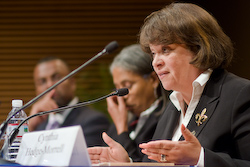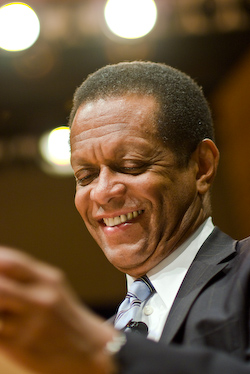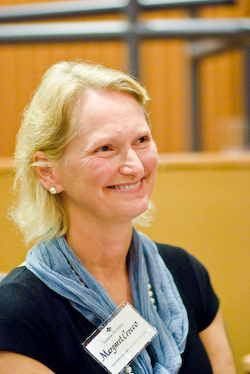Launching "Levees"
A debut event for a new civic curriculum sounds a call to action in the wake of Hurricane Katrina
“There is a culture in this country in which we don’t take responsibility for anything. If we’re among the privileged, if our wealth was passed on from family to family, we live in our own little society and we make everything else disappear. You compare that with the
Those sentiments, uttered by New Orleans City Councilwoman Cynthia Hedge-Morrell, captured the spirit of the launch event held in September for “Teaching The Levees: A Curriculum for Democratic Dialogue and Civic Engagement,” a 100-page teaching tool developed by TC faculty, students, staff and alumni. The curriculum is cued to the four-hour HBO documentary by Spike Lee, “When the Levees Broke: A Requiem in Four Act,” which captures firsthand the plight of
The curriculum – which is being distributed free of charge to 30,000 teachers nationwide, together with a DVD of the film -- bills itself as a vehicle for prompting the kind of difficult discussions about race and class that typically don’t happen in American classrooms. Certainly if the launch event, attended by over 600 people in TC’s
“It’s important that our launch event today be a call to action as well as a discussion that seeks to make sense of something that’s incomprehensible,” said Margaret Crocco, Professor of Social Studies and Education, and lead architect of the curriculum, which was developed with the support of the Rockefeller Foundation and in conjunction with HBO.
Citing Martin Luther King’s observation during the Civil Rights era that “there are in the white South millions of people of good will whose voices are yet unheard, whose course is yet unclear, and whose courageous acts are yet unseen,” Crocco said that if America fails to address the issues raised by Katrina and its aftermath, “history will have to record the appalling silence of this period. So we must leave here today heeding King’s call, keeping alive honest conversations about race and class in this country.”
TC President Susan Fuhrman, following Crocco to the podium, called the launch event a celebration “of the power of art and education to extract lessons from even the most tragic events,” and described “Teaching The Levees” as “an extraordinary curriculum that expands upon an extraordinary film.
“I can think of no other curriculum crafted so indelibly around a single historical event, yet reaching beyond it to deal with themes that are timeless,” she said. “It has the power to bring together educators and students from around the world.”
The nearly three-hour program featured remarks by a large cast of guest speakers, including Marcia Lyles, Deputy Chancellor of New York City Public Schools; Darren Walker of the Rockefeller Foundation; Jackie Glover of HBO; and Sam Pollard, co-producer of “When The Levees Broke.” However, the heart of the proceedings was a panel discussion chaired by New York Times columnist Bob Herbert that featured Hedge-Morrell; Columbia University President Lee Bollinger; Gloria Ladson-Billings of the
Herbert’s first question – “Have we learned anything from the Katrina experience? And are you optimistic or pessimistic as a result?– triggered impassioned answers from all the speakers.
Hedge-Morrell, whose district includes the heavily damaged Ninth Ward, said that one painful lesson for her has been how “the media instantly made the victims the problem.
“Any time the media has reported on poor people of color in this whole tragedy, it’s always been the glass half empty. They focus on the Ninth Ward to show that the area was poor and destitute to begin with and that there’s no need to rebuild it. They don’t say that the vast majority of people there were property owners, taxpayers and productive citizens.” In contrast, when the media has portrayed wealthier people – primarily those who are white – the stories have a sense of hope and the possibility for recovery, Hedge-Morrell said.
On the brighter side, she added, “I continue to see that the American people are unbelievable. We’ve had such an influx of citizens – people taking off from their jobs, people on break from college, people spending a year of their life – to help rebuild.”
Ladson-Billings, the Kellner Family Professor in Urban Education in the Department of Curriculum and Instruction at the University of Wisconsin-Madison, said that “the jury is out” for her on whether the country has learned anything from Katrina.
“I tell my students to see me as neither optimistic nor pessimistic, but as ‘pissimistic’, because I’m so pissed off,” she said, drawing a laugh. “We teach
“It’s a pattern of behavior –we have to make up our minds as citizens that it matters when people die, or when people lose everything they have. We live in a country where some people matter more than others, even in death. Because we know how exactly how many soldiers have died in
As for the future – “I’m never optimistic, I’m from
Lee Bollinger, President of Columbia University and an ardent defender of affirmative action in higher education, said that the Katrina experience has confirmed for him the feeling that “we’ve lost a sense of national purpose, a mission or will to deal with issues of race, class and inner city deprivation.
“My whole training at
Bollinger said that the recent Supreme Court decision striking down racial balance efforts in public schools in
“That the Supreme Court would say that Brown prohibits local school boards from trying to address issues of racial segregation – how did we get to that point?”
Herbert also asked the panelists if they thought a meaningful national conversation on race and class will ever take place. The answers ranged from guarded to despairing.
“I doubt we’ll ever have such a conversation because then we’ll have to talk about the complicity of every single person,” said Ladson-Billings. “People say about racism or slavery, ‘Well, it’s the South.’ But it was the textile factories in
Glaude said that conversation about race is hindered by “a deodorized representation of the ‘60s.
“Part of the problem with how we talk about race in
Hedge-Morrell suggested that honest conversation begins with truth in reporting, observing that “St. Bernard Parish, which is 98 percent white, was totally wiped out, and you never saw that on CNN or Anderson Cooper. And just today I read a statistic that more whites died in
Bollinger said that economics may be eclipsing issues not only of race and class, but also of democratic values. “This is an amazing time, and there’s no question that economic activity today is incredibly generative of a new life, with very real benefits for many people,” he said. “But economic value isn’t the only thing we live by. There are higher values – being part of a community, of a society; a sense of fairness – all those things that are enshrined in the Constitution. That’s the kind of discussion that needs to be held, but it’s being crowded out by events like
What’s needed, he added, is some galvanizing event that will motivate people to change the terms of the discussion. “You’d think Katrina would do that, but it hasn’t done it yet. So I’m more baffled today than I was three to five years ago.”
As the discussion came to a close, it was Ladson-Billings who perhaps most poignantly described the current lack of civic engagement around issues of the sort raised by Katrina – and who offered the best hope for the future.
“I’m most frustrated by the almost total evacuation of the public space,” she said. “I’m old enough to remember a time when the word ‘public’ was not pejorative. I got my public polio vaccine. People in my family moved into public housing that was safe, reliable and affordable, to get away from unscrupulous private landlords. And if you wanted to move forward in society, you went to public schools
“Now we all want to live in private, gated communities. Consumerism prevents us from seeing ourselves as public citizens. You might remember that after 9/11, our head of state urged us to go out and shop. Well, I say, Don’t reduce me to a consumer. What can I do to really help people?”
Still, Ladson Billings said, she takes hope from the thought that “we’re not that old of a nation. We’re a teen-aged nation, and that comes with all the calamity and optimism associated with that age, as anyone who has tried to live with teen-agers knows. Adolescents grow physically quite quickly, but their minds don’t catch up to that growth for a while. And that’s where I think we are now. We’re this large, physically powerful nation, but there’s lots of room for our minds to grow.”
Published Friday, Sep. 7, 2007


